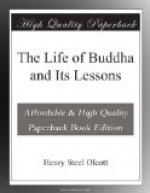If I have the temerity to prefer my own definition of the spirit of Buddha’s doctrine, it is because I think that all the misconceptions of it have arisen from a failure to understand his idea of what is real and what is unreal, what worth longing and striving for and what not. From this misconception have come all the unfounded charges that Buddhism is an “atheistical,” that is to say, a grossly materialistic, a nihilistic, a negative, a vice-breeding religion. Buddhism denies the existence of a personal God—true: therefore—well, therefore, and notwithstanding all this, its teaching is neither what may be called properly atheistical, nihilistic, negative, nor provocative of vice. I will try to make my meaning clear, and the advancement of modern scientific research helps in this direction. Science divides the universe for us into two elements—matter and force; accounting for their phenomena by their combinations, and making both eternal and obedient to eternal and immutable law. The speculations of men of science have carried them to the outermost verge of the physical universe. Behind them lie not only a thousand brilliant triumphs by which a part of Nature’s secrets have been wrung from her, but also more thousands of failures to fathom her deep mysteries. They have proved thought material, since it is the evolution of the gray tissue of the brain, and a recent German experimentalist, Professor Dr. Jaeger, claims to have proved that man’s soul is “a volatile odoriferous principle, capable of solution in glycerine”. Psychogen is the name he gives to it, and his experiments show that it is present not merely in the body as a whole, but in every individual cell, in the ovum, and even in the ultimate elements of protoplasm. I need hardly say to so intelligent an audience as this, that these highly interesting experiments of Dr. Jaeger are corroborated by many facts, both physiological and psychological, that have been always noticed among all nations; facts which are woven into popular proverbs, legends, folk-lore fables, mythologies and theologies, the world over. Now, if thought is matter and soul is matter, then Buddha, in recognising the impermanence of sensual enjoyment or experience of any kind, and the instability of every material form, the human soul included, uttered a profound and scientific truth, And since the very idea of gratification or suffering is inseparable from that of material being—absolute spirit alone being regarded by common consent as perfect, changeless and Eternal—therefore, in teaching the doctrine that conquest of the material self, with all its lusts, desires, loves, hopes, ambitions and hates, frees one from pain, and leads to Nirvana, the state of Perfect Rest, he preached the rest of an untinged, untainted existence in the Spirit. Though the soul be composed of the finest conceivable substance, yet if substance at all—as Dr. Jaeger seems able to prove, and ages of human intercourse with the weird phantoms of the shadow world imply—it




